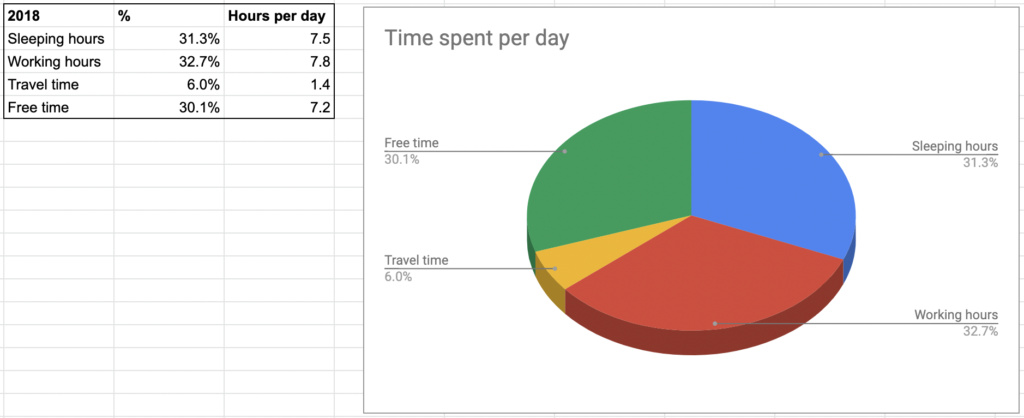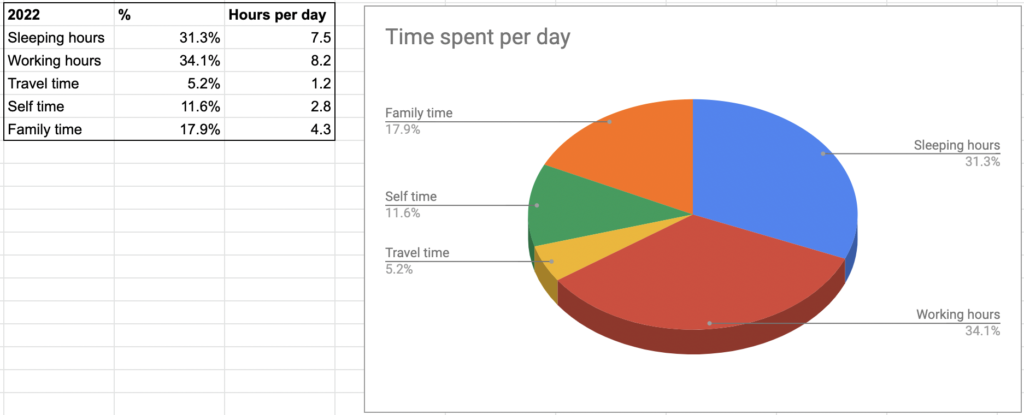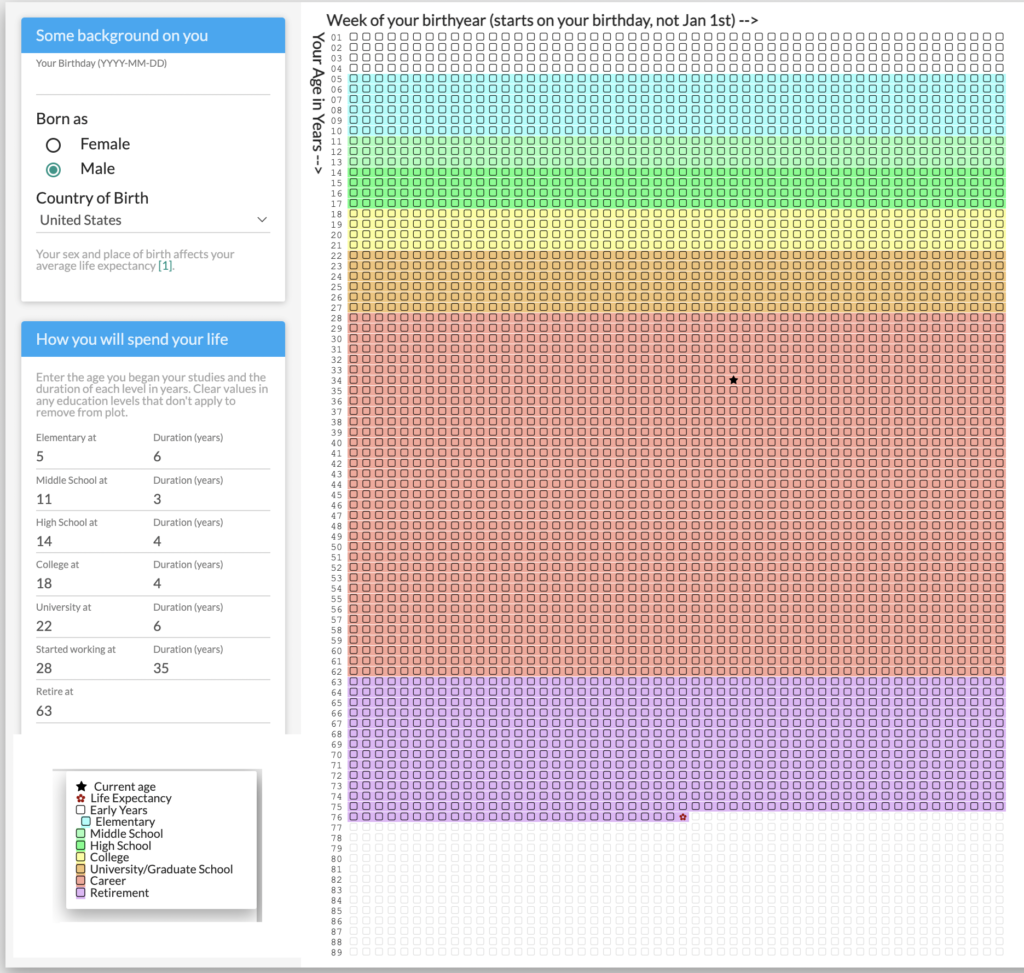How many hours does a full-spectrum Family Physician work?
After a pandemic and two children, I began thinking again about how I spend my time overall. Does it align with the goals for my life? How does one balance a career, family, and self-care? In 2018, one year after residency, I had this question and calculated exactly how I spent my time. I recorded my findings and conclusion in this article. In short, in 2018, I averaged 54.9 hours of work per “work” week which was 33% of my total living time.
How many hours do I work?
As of July, 2022, I am still working full time as a Family Physician doing primary care, inpatient obstetrics, and adult hospital medicine in an academic institution in an urban setting in the Northeast. I still work with the same employer, with about the same job as 2018. I recalculated how I spend my time:
- I average 57.3 hours of work per “working” week (range 45 to 70 hours)
- This amounts to 2,556 hours working per year (When accounting for vacation, CME, and holiday time I work 44.6 “working weeks” per year)

Is this a lot? Is this average? I reviewed the literature of how many hours doctors work later below!
Assumptions and Calculations
These calculations are based off of many assumptions. If you care to know, here is how I break down the time for work— otherwise skip this section.
Having an outpatient primary care panel of patients involves the work of seeing patients and the work behind-the-scenes. Being part of a residency also includes behind-the-scenes work. I attempt to calculate that below. See my original 2018 article that describes this in more detail. My work changes week by week since I do primary care, inpatient obstetrics, and adult hospital medicine. The best way to calculate this is in 4 week intervals which you will see below. Definitions for non Family Physicians: MCH = Maternal Child Health (inpatient obstetrics/labor and delivery, postpartum rounding, triage); FMIS = Family Medicine Inpatient Service.
- Work
- Overall breakdown of my work as a Family Physician. I work full time and am currently into my 6th year out of residency
- 3 shifts of MCH per month (10-14 hour shifts); of that, I do about 1.3 night shifts per month
- 3 shifts of inpatient medicine per month (12 hour shifts); I do not do nights anymore
- On top of my full time work, I average about 4 hours of hospital medicine moonlighting per month
- 1-4 clinic sessions per week (700+ total patient panel)
- 1-2 precepting sessions per week
- I have 5 weeks of vacation per year (25 days) and 5 days of CME per year
- I do about 45-70 minutes of in basket work per day of scheduled clinic (per May and June 2022 Epic Signal data which also matches qualitatively what I feel)
- Weekly estimate for work hours ranges 45 to 70 hours per week; average is 57.3 hours per week
- Clinic day: 8 hours + 1 hour lunch + 1 hour in basket/paperwork (5-6 PM) + 1 hour at home = 11 hour day
- FMIS day: 12 hours
- 4 week average: 45+57+63+64=234=57.3
- The above does not include wholly or in part:
- Time spent in email
- Grand rounds, M&Ms, faculty meetings, training (e.g. BLS, EHR, annual compliance)
- Mentoring, coaching; residency events, residency evaluations, and related work
- Coordinating my schedule and integrating my multiple calendars
- Special circumstances like when preparing for presentations and lectures, big projects
- Interviewing potential faculty
- Overall breakdown of my work as a Family Physician. I work full time and am currently into my 6th year out of residency
- Travel/commuting to work
- 55 min * 2 ways= 110 minutes per shift/day
- 4 weeks = 8.7 hours per week
- Family/Home (time with children)
- Clinic day calculation
- Getting them ready for daycare, breakfast: 5-6:30 to 7 AM = 1 hour
- Dinner time, play, bedtime routine: 6-7 PM to 8 PM = 1.5 hours
- 2.5 hours per day at most with children when working a full clinic day
- Inpatient shift calculation
- Sometimes I come home early and other times late
- Dinner time, play, bedtime routine: 6 to 8 PM = 2 hours with children sometimes when working inpatient medicine (optimistically)
- Weekend calculation
- 6 AM to 8 PM = 14 hours
- 4 week calculation
- 120 hours per 4 weeks spent with children optimistically: range 25 to 40.5 hours per week = average is 30 hours per week
- Clinic day calculation
- Self time
- 8 to 9 PM = cleaning, preparing kids food for the next day, laundry, home repair, family planning = 1 hour
- 9 to 10:30 PM = gaming, TV, journaling, notes, in basket, emails = 1.5 hours
- Sleep 10:30 PM to 6 AM = 7.5 hours per day (somewhat optimistic calculation)
- Exercise: 1-2 hours biking per week (mostly in warm weather and optimistically calculated)
Comparing Myself to 2018
I created graphs comparing myself now in 2022 to myself in 2018. The first major difference is that the time spent working has increased. This could be because I am more accurate and realistic about the hours I work now or I could actually be working more than four years ago. Another notable difference, in 2018 I designated “Free time” as anytime not sleeping, working, or commuting. That time has now split to “Family time” and “Self time”. There is a lot of overlap in what they could mean, but for me these are useful to divide and I have strictly accounted those hours here. Of note, these are total averages and thus mixes weekdays with weekends, vacation, and other time off.


Discussion & Conclusion
I did a quick literature review of studies about physician work hours (click the link for the full source review). In a 2021 JAMA article, the average number of hours worked per week pre-covid (March 2020) was 50.8 (average of all physicians). This decreased to a low of 47.5 in May 2020. The 2018 AAFP Practice Profile survey found Family physicians working on average 51 hours per week. A 2011 study in JAMA, using 2004-2005 data of physicians working, set the family physician hours worked in a year as the “average” in which other specialties are compared to: family doctors in that study worked 2,524 hours per year total.
In conclusion, I work incrementally more than the average family doctor. Compared to the above studies, I work about 6.5 more hours per “working week” (57.3 versus 50.8) or about 32 more hours per year (2,556 versus 2,524).
A small caveat is that I work about 4 hours of moonlighting for hospital medicine per month. The studies I read did not specify providers who moonlighted. Considering this, my average would decrease to about 56.3 hours per week.
Relatedly, I could not tell from the studies I reviewed any discussion about the percentage of part-time physicians. Subjectively I know a significant number of physicians who do not work full-time. The 2021 JAMA article suggests that many physicians went part-time due to the stress of the pandemic. I work full-time and going down to 80% FTE would significantly change my weekly work hours.
Burnout & Wellbeing
Is this normal? Is this right? Is this sustainable? Is this a lifestyle I want to live? The scope of this article is to simply calculate the hours I work and compare it to available literature. The subsequent logic however is to answer these kind of questions. There are many times that I feel like I work too much. My situation is unique in that the range of the number of hours I work is likely extreme compared to other physicians due to the many parts of my job (My weekly work hours range from 45 to 70 hours). A primary care outpatient-only physician may never work weekends or nights nor fluctuate more than a few hours per week. For me, there are weeks that feel easy and other weeks that seem impossible. I’ve experienced two burnout seasons that lasted a few weeks in which when I went to work I wanted to simply survive the day, let alone thrive or enjoy my time with others. When I look back, they correlate to the time during Covid surges in the hospital, so I wonder if my burnout episodes would have happened if the pandemic never occurred. The feeling that I work too much also is affected by having two young children. As much as we love them, children have definitely challenged my wife and me in terms of how we spend our time at home. We learned that our personal alone/self time is important and are still figuring out ways to synergize this with family time. With both of them being in daycare, they get sick almost every 2-3 weeks resulting in one of us scrambling to get time off for a few days while we wait for their covid test or quarantine to finish.
The factors that contribute to answering this questions are personal and unique to every individual. For me, our financial plan is a crucial component: When does this lifestyle allow us to retire? When will we able to afford a desirable house? When will we pay off all our student loans? How much can we provide for our children? When I calculated the expected accomplishment of these goals there comes a certain strength that allows us run towards the prize. In addition, personal job satisfaction factors into answering these questions. I have a passion for teaching and serving underserved populations and look forward to doing these things make it easier for me to come to work every day. Seeing patients is the genuinely fun part (it’s the paperwork and EMR in basket that drags). Long-term relationships with my patients (especially the families with babies I delivered) and making the world a better place are profoundly rewarding (see my 2018 article describes more about the literature of burnout and wellbeing). Full spectrum family medicine is shown to be in itself less prone to burnout compared to non full-spectrum work. Lastly, my spiritual beliefs are an integral reason I do my work. Am I loving God by loving and serving those around me? Am I taking part in the healing of my brothers and sisters? Am I relieving suffering and bringing life into this world?
Overall, I am happy with where I am in terms of work. Doing this personal study and literature review helps me manage the frustrating feeling that I work too much– the feeling is attenuated knowing that I work about the average and certainly less than the extreme hours some physician specialties worked. Knowing that I am achieving clear financial goals and doing meaningful work daily is significantly helpful. For now, I believe this kind of full-time full-spectrum Family Physician is sustainable for me.
Precious

A famous Wait But Why comic shows a graph of a typical life in terms of weeks. The comic visually shows the amount of a human life. It’s a poetic reminder of how precious our time is on Earth. Having children and working through a pandemic has certainly made me think about life and death. I’ve fortunately reached a point emotionally and spiritually that I can really sit and ponder these things without a sense of impending doom but from a stillness of peace and gratefulness.
I highly recommend reading the comic as the wisdom at the end is incredibly profound. You can build your own Life in Weeks graph via this link.
Other Discussion Points and Questions to Ponder
There are many other questions and points to think about as I meditate about these things:
- Why are physicians expected to work hours that are almost 1.5-2x a “normal job”?
- Is this lifestyle due to the culture of modern life, Western life, capitalist/consumer life?
- Is this enough time for the other goals that I have personally outside of work? An interesting number is seeing that I have about 1,000 hours per year designated for self time. How does one use 1,000 hours?
- I work more than I see my children per “work” week. How does one maximize quality of time with children if quantity of time is is less than work time?
- Is a 20% reduction in salary worth 6.5% decrease in work time total if I go part time?
- I don’t know the data, but I subjectively know many physicians who work less than full-term. The math is revealing: If I remove one clinic day, I will work 46.3 hours per week (resulting in 27.6% of my total time working, which is a 6.5% decrease). I can emotionally/tangibly see that working 40 hours a week is more comfortable with a family; 50s is just doable; 60+ is bonkers
- The amount of vacation, CME, holiday time really changes the overall hours worked yearly and not so much the average of hours worked yearly.
- My parents and wife are immigrants to the United States and this cultural point of view shapes how I see work. My parents and in-laws are not impressed by the hours we work because they’ve worked the same or more amount with far less pay. It’s a challenging perspective to hold and something I do not want to under or over value. They worked to “survive” and we live to “thrive”— a privilege of ours in some sense.
Leave a Reply